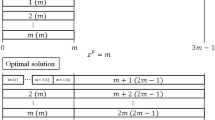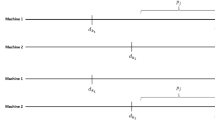Abstract
Multiprocessor jobs require more than one processor at the same moment of time. We consider two basic variants of scheduling multiprocessor jobs with various regular criteria. In the first variant, for each job the number of required processors is given and fixed, and the job can be processed on any subset of parallel processors of this size. In the second variant, the subset of dedicated processors required by a job is given and fixed. A sequence dependent setup time is needed between different jobs. We formulate mixed integer linear programming models based on a continuous time representation for the NP-hard scheduling problems under consideration. Using these models, we identify new polynomially solvable cases with the number of jobs bounded above by a constant.
Access this chapter
Tax calculation will be finalised at checkout
Purchases are for personal use only
Similar content being viewed by others
References
Drozdowski, M.: Scheduling for Parallel Processing, p. 386. Springer, London (2009)
Eremeev, A.V., Kovalenko, J.V.: On multi-product lot-sizing and scheduling with multi-machine technologies. In: Lübbecke, M., Koster, A., Letmathe, P., Peis, B., Walther, G. (eds.) Operations Research Proceedings 2014. Operations Research Proceedings, pp. 301–306. Springer, Heidelberg (2016)
Garey, M.R., Johnson, D.S.: Computers and Intractability: A Guide to the Theory of NP-Completeness. W.H. Freeman and Company, San Francisco (1979)
Grötschel, M., Lovász, L., Schrijver, A.: Geometric Algorithms and Combinatorial Optimizations, 2nd edn, p. 362. Springer, Heidelberg (1993)
Itai, A., Papadimitriou, C.H., Szwarcfiter, J.L.: Hamilton paths in grid graphs. SIAM J. Comput. 11(4), 676–686 (1982)
Ierapetritou, M.G., Floudas, C.A.: Effective continuous-time formulation for short-term scheduling: I. multipurpose batch process. Ind. Eng. Chem. Res. 37, 4341–4359 (1998)
Jansen, K., Porkolab, L.: Preemptive parallel task scheduling in O(n)+poly(m) time. In: Lee, D.T., Teng, S.-H. (eds.) ISAAC 2000. LNCS, vol. 1969, pp. 398–409. Springer, Heidelberg (2000)
Jansen, K., Porkolab, L.: Preemptive scheduling with dedicated processors: applications of fractional graph coloring. J. Sched. 7, 35–48 (2004)
Mukhacheva, E.A., Mukhacheva, A.S.: L.V. Kantorovich and cutting-packing problems: new approaches to combinatorial problems of linear cutting and rectangular packing. J. Math. Sci. 133(4), 1504–1512 (2006)
Shaik, M.A., Floudas, C.A., Kallrath, J., Pitz, H.J.: Production scheduling of a large-scale industrial continuous plant: short-term and medium-term scheduling. Comput. Chem. Eng. 33, 670–686 (2009)
Tanaev, V.S., Kovalyov, M.Y., Shafransky, Y.M.: Scheduling theory. Group Technologies, Minsk, Institute of Technical Cybernetics NAN of Belarus (1998). (in Russian)
Acknowledgements
This research is supported by the Russian Science Foundation grant 15-11-10009. The authors are grateful to M.Y. Kovalyov for helpful remarks.
Author information
Authors and Affiliations
Corresponding author
Editor information
Editors and Affiliations
Appendix: The Proof of Proposition 1
Appendix: The Proof of Proposition 1
Proposition 1
Problems \(1|pmtn,\varDelta s_{jj'}|\gamma \) and \(1|\varDelta s_{jj'}|\gamma \) with \(\gamma \in \{C_{\max }, L_{\max }, C_{\sum }, L_{\sum }\}\) are strongly NP-hard.
Proof. We will consider only \(C_{\sum }\) criterion since the problems with other three criteria are treated analogously.
In [5] it is proven that recognition of grid graphs with a Hamiltonian path (the Hamilton Path Problem) is NP-complete. Recall that a graph \(G'=(V',E')\) with vertex set \(V'\) and edge set \(E'\) is called a grid graph, if its vertices are the integer vectors \(v=(x_v,y_v)\in \mathbf{Z}^2\) on plane, i.e., \(V' \subset \mathbf{Z}^2\), and a pair of vertices is connected by an edge iff the Euclidean distance between them is equal to 1. Here and below, \(\mathbf Z\) denotes the set of integer numbers. We can assume that graph \(G'\) is connected since otherwise Hamiltonian path does not exist and this can be recognized in polynomial time.
Let us first reduce Hamilton Path problem to \(1|\varDelta s_{jj'}|C_{\sum }\), assuming that jobs correspond to vertices and the setup times are equal to Euclidean distances between the integer points where the corresponding vertices are located. All processing times \(p_j=1\).
Then minimal setup times are equal to one. The earliest completion times of the jobs are \(1, 3, 5, 7,\dots , 2k-1\), where k is the number of jobs.
In the recognition version of \(1|\varDelta s_{jj'}|C_{\sum }\) it is required to answer the question: Is there a schedule with \(C_{\sum }\) value not greater than a given value K?
Let us put \(K:=(1+3+5+7+..+2k-1)=k^2\).
On one hand, if a schedule with the value of \(C_{\sum }\) at most K exists, then all setups of this schedule are equal to 1 and graph \(G'\) contains a Hamilton path. On the other hand, if graph \(G'\) contains a Hamilton path then ordering the jobs in the sequence of vertices of this path we obtain a schedule with the value of \(C_{\sum }=k^2.\)
This reduction is computable in polynomial time and all input parameters of \(1|\varDelta s_{jj'}|C_{\sum }\) instance are upper bonded by k, so we conclude that \(1|\varDelta s_{jj'}|C_{\sum }\) problem is strongly NP-hard.
In the case of \(1|pmtn,\varDelta s_{jj'}|C_{\sum }\) problem we construct the same reduction. Note that in a schedule with \(C_{\sum } \le k^2\) the preemptions are impossible. Indeed, suppose that job \(j'\) is the first job that has a preemption and all n preceding jobs have no preemptions. Let job \(j'\) be executed for a units of time and then preemption took place and let \(j''\) be the first job, which finishes after this preemption.
In case \(j''\ne j'\), job \(j''\) ends at time \(t\ge 2(n+1)-1+a\). In this case even if all jobs after \(j''\) finish in the earliest possible times \(2(n+2)-1,\ 2(n+3)-1,\dots , 2k-1\), then still \(C_{\sum }>k^2\).
In case \(j''= j'\), job \(j'\) ends at time \(t\ge 2(n+1)-1+b\), where b is the total preemption time of job \(j'\). Thus by the same reasoning as in the previous case, we conclude that \(C_{\sum }>k^2\). \(\square \)
Rights and permissions
Copyright information
© 2016 Springer International Publishing Switzerland
About this paper
Cite this paper
Eremeev, A.V., Kovalenko, Y.V. (2016). Mixed Integer Programming Approach to Multiprocessor Job Scheduling with Setup Times. In: Kochetov, Y., Khachay, M., Beresnev, V., Nurminski, E., Pardalos, P. (eds) Discrete Optimization and Operations Research. DOOR 2016. Lecture Notes in Computer Science(), vol 9869. Springer, Cham. https://doi.org/10.1007/978-3-319-44914-2_24
Download citation
DOI: https://doi.org/10.1007/978-3-319-44914-2_24
Published:
Publisher Name: Springer, Cham
Print ISBN: 978-3-319-44913-5
Online ISBN: 978-3-319-44914-2
eBook Packages: Computer ScienceComputer Science (R0)




